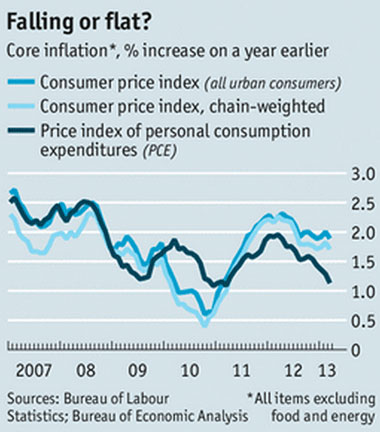I am constantly annoyed by reading inflation hawks warn that all this so-called “monetary stimulus” will hurt the Germans, or the elderly in Japan, or Americans that save. Meanwhile, in the real world:
Over the past 12 months, inflation has risen just 0.7 percent, the smallest gain since October 2009 and pushing further below the Federal Reserve’s 2 percent target. The index had increased 1.0 percent in the period through March.
Core prices were up 1.1 percent, the smallest rise since March 2011 and slowing from 1.2 percent in March.
The fact of the matter is that if the Fed did actual monetary stimulus beyond my wildest imagination they’d still be unlikely to get the inflation rate up to their legal mandate for the period from 2008 to 2016. That’s right, inflation will almost certain run under 2% during that 8 year period, even if the Fed does what I want them to do (and money is still too tight.) Take a look at the PCE core rate, which is the one the Fed targets:

Notice that it was above 2% before the recession, and has been consistently below 2% ever since. And yet the Fed’s legal mandate calls for exactly the opposite pattern. They are required to focus on both inflation and employment, which means higher than 2% during periods of high unemployment and vice verse. As George Selgin points out in this video, the rate of inflation should be lower during periods of strong growth than otherwise. (Although George prefers a policy that would lead to a lower average rate of NGDP growth than I prefer.)
In Japan, prices continue to fall despite a massive depreciation of the yen. That means that without Abenomics the rate of deflation would be even greater, as we know that (at a minimum) a sharp currency depreciation will boost import prices.
I really want to pull my hair out when I hear pundits warn of high inflation. All they are doing is discrediting whatever macroeconomic philosophy they espouse. Unfortunately for me, most of the inflation Cassandras (albeit not all) are on the right. They share my views on many other issues. When the high inflation does not happen (and it won’t) their views will be even more discredited than they were after the failure of “austerity” to boost growth in Europe.
The good news is that inflation doesn’t matter, NGDP growth matters. So as long as Abenomics boosts NGDP growth, it really doesn’t matter what happens to inflation.
Prediction: At some point in the next 12 months the ECB will realize that the eurozone NGDP is not going to recover on its own, and they will launch a program of monetary stimulus. The Germans will squeal, but inflation will continue to run BELOW the ECB’s legal mandate. In other words, everyone will claim the Germans are being screwed, whereas the truth will be the exact opposite.



Leave a Reply